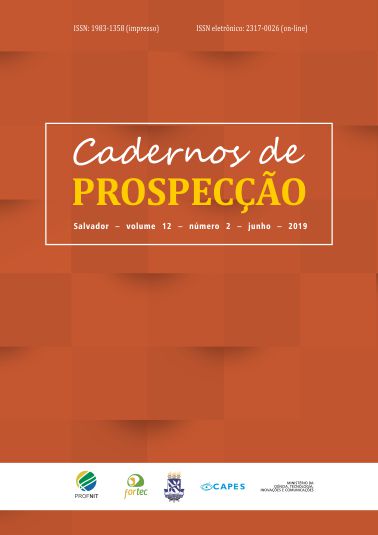Editorial
DOI:
https://doi.org/10.9771/cp.v12i2.28808Resumo
Neste volume, a Revista Cadernos de Prospecção, em sua missão de difundir e socializar o conhecimento científico relacionado à inovação e produzido nas mais diversas entidades, publica 18 artigos. Desses, 13 abordam o tema Prospecção Tecnológica, quatro apresentam pequenos empreendimentos que buscam o desenvolvimento por meio de mecanismos e arranjos tecnológicos, e um artigo trata sobre a Indicação Geográfica (IG).
A Prospecção Tecnológica qualifica as pesquisas, pois visa a verificar as fronteiras em que o conhecimento em determinada área específica se encontra em um dado momento.
Este volume apresenta estudos prospectivos sobre várias tecnologias, envolvendo meio ambiente, alimentos, cosméticos, entre outros.
No Brasil, a transferência de tecnologia tem sido um dos grandes gargalos no processo de inovação, principalmente no que diz respeito a recursos financeiros e técnicos para o fechamento do ciclo de inovação, que ocorre quando a tecnologia, chega ao mercado. A transferência de tecnologia das Instituições Científicas e Tecnológicas (ICTs) para setor produtivo tem avançado a passos lentos.
Destaca-se o papel dos Núcleos de Inovação (NITs), criados pela Lei nº 10.973/2004, Lei de Inovação Tecnológica, regulamentada pelo Decreto nº 5.563/2005, como atores importantes para que as tecnologias desenvolvidas nas ICTs alcancem o mercado. Assim, os NITs têm, em suas atribuições, transferir essas tecnologias para parceiros que as aplicarão em produtos.
Mesmo com o aparato regulatório, os NITs têm encontrado dificuldades em realizar essa transferência, restringindo-se, muitas vezes, apenas à proteção da propriedade intelectual, motivada por diversos fatores, como falta de pessoal qualificado e segurança jurídica requerida para os aspectos negociais envolvidos na transferência de tecnologia.
Nesse sentido, o novo Marco Legal, instituído por meio da Lei nº 13.243/2016, regulamentada pelo Decreto Federal nº 9.283/2018, busca trazer mecanismos facilitadores para criar um ambiente mais favorável à interação entre empresas e ICTs públicas, destacando-se algumas flexibilizações específicas da Lei n. 8.666/1993 e suas alterações (conhecida como Lei das Licitações) e a Lei n. 8.112/1990 e suas alterações (conhecida como Lei do Servidor Público). Salienta-se que há aspectos que impactam diretamente no processo de transferência de tecnologia, contudo para que as ICTs públicas façam uso das benécias previstas nesses documentos legais, é necessário que a ICT tenha previsão em sua Política de Inovação sobre a maneira como irá operacionalizar a versatilidade possibilitada pela legislação.
Os arranjos produtivos locais (APL) se apresentam como uma ação coletiva, potencializando recursos, tanto técnicos como financeiros, pois as tecnologias que brotam dessa coletividade colocam a inovação tecnológica como base para a inovação social e também promovem o desenvolvimento regional como um todo.
A leitura do conteúdo apresentado neste volume enriquecerá o conhecimento, conforme os propósitos dos artigos elaborados pelos respectivos autores.
Boa leitura.
Downloads
Downloads
Publicado
Como Citar
Edição
Seção
Licença
Copyright (c) 2019 Cadernos de Prospecção

Este trabalho está licenciado sob uma licença Creative Commons Attribution-NonCommercial 4.0 International License.
O autor declara que: - Todos os autores foram nomeados. - Está submetendo o manuscrito com o consentimento dos outros autores. - Caso o trabalho submetido tiver sido contratado por algum empregador, tem o consentimento do referido empregador. - Os autores estão cientes de que é condição de publicação que os manuscritos submetidos a esta revista não tenham sido publicados anteriormente e não sejam submetidos ou publicados simultaneamente em outro periódico sem prévia autorização do Conselho Editorial. - Os autores concordam que o seu artigo ou parte dele possa ser distribuído e/ou reproduzido por qualquer forma, incluindo traduções, desde que sejam citados de modo completo esta revista e os autores do manuscrito. - Revista Cadernos de Prospecção está licenciado com uma Licença Creative Commons Attribution 4.0. Esta licença permite que outros remixem, adaptem e criem a partir do seu trabalho para fins não comerciais, e embora os novos trabalhos tenham de lhe atribuir o devido crédito e não possam ser usados para fins comerciais, os usuários não têm de licenciar esses trabalhos derivados sob os mesmos termos.
Este obra está licenciado com uma Licença Creative Commons Atribuição 4.0 Internacional.








